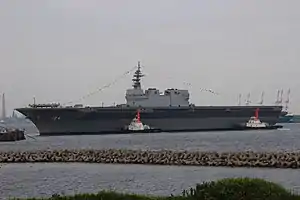JS Kaga
JS Kaga (DDH-184) is a helicopter carrier being converted into an aircraft carrier beginning in March, 2022. Officially classified as a multi-purpose operation destroyer, she is the second ship in the Izumo class of the Japan Maritime Self-Defense Force (JMSDF), the other being JS Izumo.[1][2][3] Her namesake arises from Kaga Province (加賀国, Kaga no kuni) in present-day Ishikawa Prefecture.
 JS Kaga (DDH-184) in August 2015 | |
| History | |
|---|---|
| Name |
|
| Namesake | Kaga Province |
| Ordered | 2010 |
| Laid down | 7 October 2013 |
| Launched | 27 August 2015 |
| Commissioned | 22 March 2017 |
| Identification |
|
| Badge |  |
| General characteristics | |
| Class and type | Izumo-class aircraft carrier |
| Displacement |
|
| Length | 248 m (814 ft) |
| Beam | 38 m (125 ft) |
| Draft | 7.5 m (25 ft) |
| Propulsion |
|
| Speed | more than 30 knots (56 km/h; 35 mph) |
| Sensors and processing systems | |
| Electronic warfare & decoys |
|
| Armament |
|
| Aircraft carried |
|
The ship bears the same name as the World War II-era Kaga, the Tosa-class battleship turned aircraft carrier that was produced in 1928 and participated in the attack on Pearl Harbor. It is also slightly longer than the World War II predecessor. Kaga and Izumo are the first aircraft carriers built by Japan since the end of World War II. Kaga was built as part of a wider Japanese military buildup, triggered from heightened Sino-Japanese tensions regarding the contested ownership of the Senkaku Islands.
Construction
Kaga was intended to replace the aging Shirane-class destroyer Kurama, based on the schedule outlined within the 23 Mid-term Defence Capability Maintenance Plan to construct a 19,500-ton helicopter destroyer. Construction began at the Yokohama plant of Japan Marine United on 7 October 2013, and the ship was launched on 27 August 2015, with the commissioning on 22 March 2017.[4] Construction of the ship cost ¥115 billion (US$1.05 billion).[5][6]
Characteristics
Aircraft carried
The ship can host up to 28 aircraft, or 14 helicopters.[7] While Japanese nomenclature calls Kaga a "multi-purpose operation destroyer", its main purpose is destroying enemy submarines.[8] Despite this, only 7 anti-submarine warfare helicopters and 2 search and rescue helicopters are planned for the initial aircraft complement. 400 troops and 50 3.5-ton trucks (or equivalent equipment) can also be carried.
Kaga's flight deck has five helicopter landing spots that allow for simultaneous landings or take-offs.[9] Like the Izumo, Kaga features no 'ski-jump' ramp for aircraft takeoff, instead using a square flight deck, in a similar manner to the American Wasp and America-class amphibious assault ships.[10]
In 2010, Forecast International reported that some design features were intended to support fixed-wing aircraft such as the Bell-Boeing V-22 Osprey and Lockheed Martin F-35 Lightning II;[11] as of 2019 both Kaga and Izumo are scheduled to be refit to accommodate the F-35B STOVL variant during its five-year overhaul in 2022. Kaga's reconstruction is estimated to be completed as early as 2021.[13]
In 2019, it was reported that Prime Minister Shinzo Abe approved a ¥26.2 trillion (US$238.72 billion) five-year defence budget, which included the upgrade of Izumo and Kaga and the purchase of a combined 147 F-35A and F-35B stealth fighters.[14] According to the newspaper Mainichi Shimbun, the Japan Air Self-Defense Force (JASDF) is planning to acquire a total of 42 F-35B variants, introducing 18 by FY2023, six in FY2024 and two in FY2025. These are to form a single squadron consisting of about 20 aircraft. Japan’s Defense Minister, Nobuo Kishi, announced that Nyutabaru Air Base in Miyazaki Prefecture, Kyushu will host the F-35Bs. The base is located near the Southwest Islands, including Okinawa, and JMSDF’s Kure Base in Hiroshima Prefecture, which is Kaga‘s home port.[15] Kaga began her initial modifications in March 2022 at the Japan Marine United (JMU) shipyard in Kure, Hiroshima Prefecture. The proposed modification of Kaga will be more extensive than for her sister ship (and significantly more expensive) and includes changes to the shape of the bow. The initial modification of Kaga is expected to take 14 months, followed by a second modification of the ship’s interior, which is expected to begin in March 2027.[16]
Size
Kaga is 812 feet (247 m) long, and displaces 27,000 tons, making it the largest ship in the Japan Maritime Self-Defense Force. However, it is considerably smaller than other contemporary aircraft carriers – the USS George H.W. Bush, for instance, is 1,092 feet (333 m) and over 100,000 tons.[8]
Air-defense
The ship is equipped with two Phalanx CiWS (close-in weapon systems) and two SeaRAM CiWS for her defense.[17]
History
Kaga toured the South China Sea and the Indian Ocean in 2018 in order to bolster Japan's presence in geostrategic waters.[18]
During a state visit to Japan in May 2019, Donald Trump visited Kaga in Yokosuka. During his visit, Trump made a speech in which he claimed that many of the United States's allies were taking advantage of its high defense budget by not spending enough on their own militaries. Trump congratulated Japan for "being a good ally and buying American", and wished them success in the coming Reiwa Era.[8]
Gallery
- JS Kaga
_right_front_view_at_Port_of_Kanazawa_July_15%252C_2017.jpg.webp) JS Kaga right front view at Port of Kanazawa (15 July 2017)
JS Kaga right front view at Port of Kanazawa (15 July 2017)_behind_view_at_Port_of_Kanazawa_July_15%252C_2017.jpg.webp) Kaga stern view, July 2017
Kaga stern view, July 2017_with_JMSDF_JS_Kaga.jpg.webp) JS Kaga with INS Chennai during JIMEX 2020 exercise.
JS Kaga with INS Chennai during JIMEX 2020 exercise.
References
- "海自のヘリコプター搭載護衛艦、「かが」と命名". Asahi Shimbun (in Japanese). August 27, 2015. Archived from the original on March 7, 2016. Retrieved August 27, 2015.
- "新護衛艦「かが」:旧日本海軍の空母「加賀」 その違いは". Mainichi Shimbun (in Japanese). August 27, 2015. Archived from the original on August 29, 2015. Retrieved August 27, 2015.
- Sam LaGrone (August 27, 2015). "Japan Launches Latest Helicopter Carrier". United States Naval Institute.
- "海自最大の護衛艦「かが」進水 ヘリ9機を同時運用". Sankei Shimbun (in Japanese). August 27, 2015.
- Gady, Franz-Stefan. "Japan Maritime Self Defense Force Commissions Second Helicopter Carrier". The Diplomat. Retrieved 2021-04-24.
- 平成24年度予算の概要 Archived 2012-11-13 at the Wayback Machine 防衛省、2頁
- Hardy, James (25 March 2015). "Japan commissions helicopter carrier Izumo". janes.com. Archived from the original on March 27, 2015. Retrieved 20 May 2015.
- Zennie, Michael. "President Trump Visited Japan's Biggest Warship Since World World II. Here's What to Know About the JS Kaga". Time.
- "Japanese Navy with JS Kaga helicopter carrier conducts maritime exercise with Indonesian navy". Navy Recognition.
- Takahashi, Kosuke. "Japan's converted Izumo-class carriers will not feature a 'ski-jump' ramp for F-35B operations". Janes. Archived from the original on 2021-02-27.
- Forecast International (21 June 2010). "Details of New Japanese 'Helicopter Destroyer'". Defensetalk.
- "Japan, US get major military exercise going amid growing Chinese activity". Free Malaysia Today.
- "Japan orders more F-35s for its upgraded carriers". World Aviation & Defence News.
- Inaba, Yoshihiro (2021-07-20). "Japan's Izumo Helicopter Destroyer Modified To Operate F-35B Fighters". Naval News. Retrieved 2021-07-20.
- "Japan Starts Conversion Work on Second Izumo-class DDH". 18 April 2022.
- "IHIMU、防衛省から平成22年度計画ヘリコプター搭載護衛艦を受注". Nikkei Shimbun. 13 April 2011. Retrieved 18 September 2011.
- Kubo, Nobuhiro; Kelly, Tim (July 4, 2018). Birsel, Robert (ed.). "Exclusive: Japanese helicopter carrier to tour South China Sea, Indian Ocean for two months". Reuters.
Japan will send a large helicopter carrier to the South China Sea and Indian Ocean for a second straight year as it looks to bolster its presence in the strategic maritime region with annual tours, two Japanese officials said.
External links
- Slavin, Erik (August 28, 2015). "Japan launches flat-top destroyer Kaga, strengthening its fleet". Stars and Stripes. Retrieved August 28, 2015.